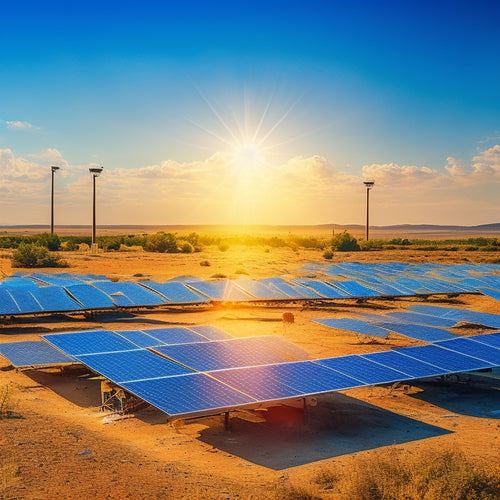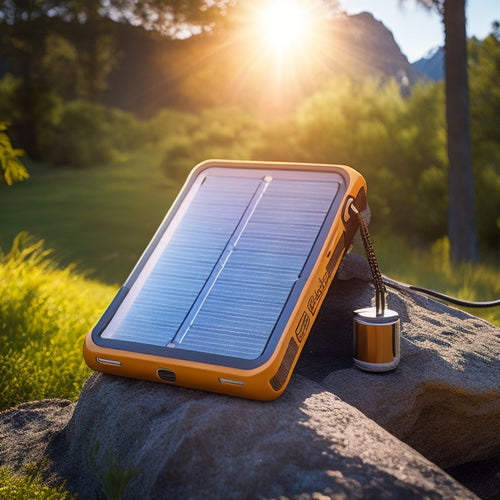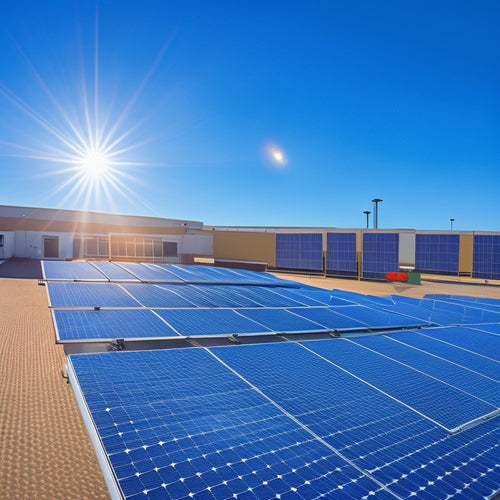
Small House Solar System Cost
Share
When considering a small house solar system, you're likely wondering about the cost. The truth is, the cost largely depends on the size of the system required to cover your energy needs. To achieve energy independence, you'll need to assess your daily energy consumption and usage patterns. A well-designed system with a properly sized grid tie inverter can lead to zero energy bills and financial savings. With advancements in panel technology, higher energy conversion rates are achievable, reducing energy losses. As you investigate the cost of a small house solar system, you'll find that understanding these factors is vital to making an informed decision about your path to energy self-sufficiency.
The Essentials
- A well-designed small house solar system can achieve zero energy bills and financial savings with proper sizing and installation.
- Inverter sizing and selection are crucial for efficient power conversion, maximizing savings, and ensuring grid compatibility.
- Higher-efficiency solar panels minimize energy losses, reduce the number of panels needed, and lead to lower system costs.
- Evaluating daily energy consumption and usage patterns is essential for sizing solar panel systems effectively and optimizing energy efficiency.
- Government-backed programs, tax credits, and rebates can significantly lower installation costs for homeowners, making solar energy more accessible and affordable.
Energy Independence Matters Most
You're likely considering a small house solar system to reduce your reliance on the grid, and that's because energy independence matters most.
By leveraging renewable energy sources like solar power, you can greatly decrease your energy bills and carbon footprint.
With an off-grid solar system, you can enjoy uninterrupted power supply wherever you are, and reduce your energy expenses by minimizing your reliance on the grid.
Achieving energy self-sufficiency means having control over your energy needs, reducing your vulnerability to price fluctuations, and enjoying the peace of mind that comes with being powered by clean energy.
Renewable Energy Sources
By utilizing renewable energy sources, homeowners can considerably reduce their reliance on the grid and take an essential step towards energy independence.
You'll not only minimize your carbon footprint but also enjoy significant long-term savings. Solar panels, in particular, offer numerous benefits. They're a clean and sustainable way to generate electricity, and their maintenance costs are virtually zero.
Additionally, you can take advantage of renewable energy incentives like tax credits and rebates, which can help offset the initial installation costs. In addition, with a Solar Power Grid, you can shield yourself against unforeseen power outages and reduce energy costs over time by utilizing free and abundant solar energy.
Another key advantage of renewable energy sources is their potential to increase your property value. As the demand for eco-friendly homes continues to rise, installing solar panels or other renewable energy systems can be a smart investment.
Energy Self Sufficiency
As the world becomes increasingly reliant on renewable energy sources, attaining energy self-sufficiency has become a top priority for many homeowners. You're likely one of them, seeking to break free from reliance on the grid and enjoy the benefits of sustainable living.
Achieving energy independence matters most, and it's within your reach with a well-designed solar system. By incorporating a home battery storage system to store excess energy generated by your solar panels, you can further reduce your reliance on the grid and lower your electricity bills.
Additionally, you can shave peak demand charges and reduce your overall energy usage during those times of the day when energy rates are at their highest. By utilizing the power of the sun, you can considerably reduce your energy bills and carbon footprint.
A small house solar system can provide you with a reliable source of clean energy, allowing you to power your home efficiently. With energy efficiency in mind, you can optimize your system's performance by incorporating energy-saving appliances and smart home devices.
Zero Energy Bills
You'll achieve zero energy expenses when your solar system produces enough electricity to match your small house's energy consumption. This means you'll pay nothing for electricity, saving you money on your utility bills.
With a well-designed system, you can enjoy bill-free living, freeing up your budget for other priorities. By taking advantage of renewable incentives, you can also benefit from government-backed programs that encourage the adoption of solar energy.
Additionally, with the decreasing cost of solar panel installation, it's now more feasible than ever to switch to a sustainable energy source.
Zero Energy Expenses
Your solar-powered small house can become a zero-energy expenses haven, where the electricity meter spins backward, crediting you for the excess energy your system produces.
With a well-designed solar panel system, you can offset your energy consumption and eliminate your electricity bills. This means you'll no longer have to worry about fluctuating energy costs or budgeting for utility payments.
To achieve zero energy expenses, you'll need to evaluate your energy usage patterns and size your solar panel system accordingly.
You may need to invest in energy-efficient appliances and lighting to reduce your overall energy consumption. Additionally, taking advantage of solar financing options and installation incentives can help offset the initial cost of your solar panel system.
Bill Free Living
Embracing a lifestyle of bill-free living means more than just reducing your energy expenses - it's about gaining independence from the grid and enjoying the peace of mind that comes with it.
By investing in a small house solar system, you'll not only reap financial savings but also contribute to sustainable living and minimize your environmental impact. With solar incentives and government rebates, the installation costs of your system can be considerably reduced, making it a more accessible goal.
As you consider DIY installation or professional setup, think about the long-term benefits of energy storage and the increased home value that comes with a solar-powered property.
By going off the grid, you'll break free from the constraints of traditional energy providers and enjoy the freedom to live life on your own terms.
With a well-designed solar system, you can rest assured that your energy needs will be met, without the burden of monthly bills.
Grid Tie Inverter Function
You'll need a grid tie inverter to convert the DC power generated by your solar panels into AC power that's compatible with the grid.
The inverter's primary function is to synchronize its output frequency and voltage with the grid's, allowing you to feed excess energy back into the grid and offset your energy bills.
By utilizing renewable energy solutions, you can greatly reduce your reliance on traditional power sources and lower your electric bill savings.
Proper inverter sizing is vital to guarantee efficient power conversion and maximize your savings, so it's important to get it right from the start.
Grid Power Conversion
The grid tie inverter function plays an essential role in the small house solar system, as it enables the conversion of DC power generated by the solar panels into AC power that's synchronized with the grid frequency and voltage. This conversion process allows you to feed excess energy back into the grid, offsetting your energy consumption and reducing your reliance on the grid.
During a solar panel installation, the grid tie inverter function guarantees that the AC power produced is compatible with the grid's requirements, making it possible to connect your system to the grid.
You'll face grid connection challenges if the AC power isn't synchronized correctly, which can lead to system shutdowns or even damage to your equipment. The grid tie inverter function eliminates these challenges by continuously monitoring the grid's voltage and frequency, adjusting the output accordingly.
This guarantees a seamless connection to the grid, allowing you to maximize your solar energy production and enjoy the benefits of net metering. By converting DC power into grid-compatible AC power, the grid tie inverter function is a critical component of your small house solar system, enabling you to generate clean energy and reduce your carbon footprint.
Inverter Sizing Importance
During the design and installation of a small house solar system, proper inverter sizing is essential to confirm peak energy production and grid compatibility. You need to select an inverter that matches your system's requirements to guarantee efficient energy conversion.
There are different inverter types, including string inverters, microinverters, and power optimizers, each with its own strengths and weaknesses.
When sizing your inverter, you'll need to take into account factors such as your solar panel array's maximum power output, voltage, and current. You'll also need to verify system compatibility by selecting an inverter that meets the grid's requirements, including voltage, frequency, and power factor.
A correctly sized inverter will prevent energy losses, reduce wear and tear on system components, and ensure that you're feeding clean energy back into the grid.
Assess Your Energy Usage
You need to determine your daily energy consumption to accurately size your solar system. To do this, you'll want to calculate your total daily energy usage in watt-hours (Wh) by identifying the appliances and devices you use, their power ratings, and the number of hours you use them each day.
As you consider your energy usage, keep in mind that residential solar panels can be paired with energy storage units to provide backup power during outages.
Daily Energy Consumption
How much energy does your small house consume on a daily basis? Understanding your daily energy consumption is vital in determining the right size of your solar system. Your daily habits play a significant role in your energy usage. For instance, do you use energy-efficient appliances or traditional ones? Do you turn off lights and electronics when not in use, or do you leave them on standby?
To assess your daily energy consumption, you need to calculate your total daily energy usage in watt-hours (Wh). You can do this by adding up the power consumption of all your appliances, lighting, and electronics.
Consider the number of hours you use each device daily and multiply it by its power rating. For example, if you use a 10W LED light for 8 hours, its daily energy consumption is 80Wh.
Understanding your daily energy consumption helps you identify areas for improvement, allowing you to make adjustments to optimize energy efficiency. By adopting energy-efficient daily habits, you can reduce your energy consumption, which in turn reduces the size of the solar system you need, ultimately saving you money.
Energy Usage Patterns
Energy usage patterns can vary greatly from one household to another, depending on individual habits and lifestyles. To accurately assess your energy usage, you need to understand your unique patterns. This involves identifying the times of day when you use the most energy, as well as the devices that consume the most power.
By doing so, you can optimize your solar panel efficiency and energy storage solutions to meet your specific needs. You may find that your energy usage peaks in the morning and evening when lights, appliances, and electronics are in use. Alternatively, you might have high energy demands during the day if you work from home or have family members who stay at home.
Higher Energy Conversion Rate
You'll want to contemplate efficient panel technology to maximize your solar system's energy conversion rate.
This involves selecting panels with high conversion efficiency ratings, typically above 20%, to minimize energy losses.
Efficient Panel Technology
Utilizing sunlight efficiently is essential for small house solar systems, and that's where advanced panel technology comes into play. You want to maximize the energy output from your solar panels, and that's where high-efficiency panels come in.
Advanced photovoltaic technology has considerably improved solar panel efficiency, allowing you to generate more power from the same amount of sunlight.
With higher-efficiency panels, you can reduce the number of panels needed to meet your energy requirements, which in turn reduces the overall system cost. This means you can enjoy more freedom from the grid while keeping your expenses in check.
Look for panels with high-efficiency ratings, typically above 20%. These panels use advanced materials and designs to minimize energy losses and maximize energy conversion.
Frequently Asked Questions
Can I Install a Small House Solar System Myself?
You can attempt a DIY installation, but it's essential to weigh the risks: improper connections can void warranties and compromise system efficiency, negating solar system advantages like energy independence and lower utility bills.
Do Solar Panels Work During a Power Outage?
You know that 72% of Americans prioritize energy independence. Now, regarding solar panels during power outages, you'll need a battery backup system to guarantee continuous functionality, as standard solar panels won't provide power when the grid is down.
Are There Any Solar Panel Maintenance Costs?
You'll need to budget for occasional solar panel cleaning and potential inverter replacement every 10-15 years, but these maintenance costs are relatively low, ensuring your energy independence isn't overshadowed by unexpected expenses.
Can I Expand My Solar System in the Future?
Ah, freedom from energy bills, how sweet! You're wondering if you can upgrade your solar system in the future, right? Fear not, you can easily add more panels or inverters, as long as you choose a system with future upgrades and system compatibility in mind, darling.
Do Solar Panels Increase My Property Value?
You'll increase your property value with solar panels, as they provide a tangible asset that enhances energy savings and potentially lowers property tax, making your home more attractive to future buyers who crave energy independence.
Final Thoughts
You'll be saving a small fortune with a small house solar system, and it's not just about the Benjamins! You'll be living the dream, with energy independence that's the envy of the entire neighborhood. Think of it - a lifetime of zero energy bills, and the freedom to power your home with clean, renewable energy. With a grid-tie inverter, you'll be generating electricity like a pro, and getting top-dollar for any excess. The cost? A drop in the bucket compared to the endless savings and satisfaction that come with utilizing the power of the sun.
Related Posts
-

What Happens Without a Charge Controller in Solar Panels
Without a charge controller in your solar panel system, you risk overheating batteries due to overcharging, which can...
-

Fastest Solar Chargers for Emergency Power
When choosing the fastest solar chargers for emergency power, you need to focus on features like rapid charging capab...
-

Essential Solar Panel Mounts for Commercial Properties
When it comes to essential solar panel mounts for your commercial property, durability and wind resistance are key fa...


